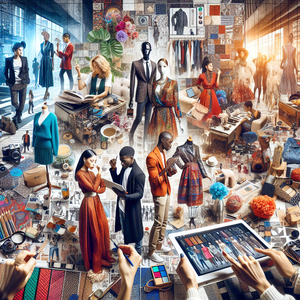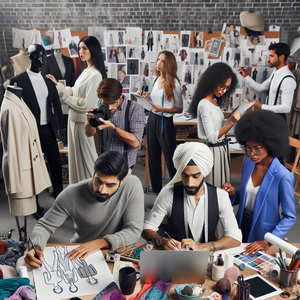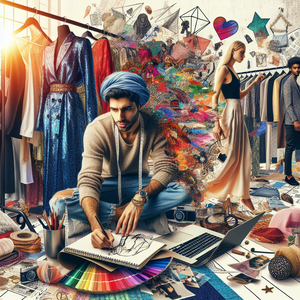
Unveiling 15 Thrilling Career Paths in Fashion Styling: A Guide for Aspiring Creatives
The world of fashion styling is a vibrant tapestry woven with creativity, personal branding, and entrepreneurial spirit. For those dreaming of a freelance career in this field, the opportunities are as diverse as the styles themselves. This exploration delves into the various roles within fashion styling, uncovering essential insights on skill development, networking, and niche identification that are critical for success. Whether you aspire to be a personal stylist or a sustainable fashion advocate, each path comes with unique responsibilities and requirements. While the freelance journey may present challenges such as income fluctuations and the need for strong professional connections, overcoming these hurdles can lead to a rewarding career where you express your creativity and make a meaningful impact on your clients. The landscape of fashion is continually evolving, and understanding the myriad paths available can help you carve out your own niche in this dynamic industry.
Job Summaries:
Freelance Fashion Stylist:
- Curate personalized outfits for clients
- Provide closet consultations
- Style clients for events
- Build a robust portfolio
- Establish connections within the industry
- Possess key skills such as trend awareness and communication
- Have a background in fashion design or merchandising
- Meet the growing demand for tailored fashion advice
Personal Stylist:
- Personal stylists work closely with clients to define their style identities.
- This involves assessing wardrobes, suggesting new purchases, and offering styling tips for special occasions.
- Understanding body types and personal branding is crucial.
- Those coming from fashion or retail backgrounds often find this role particularly fulfilling.
- They help clients boost their confidence and satisfaction.
Virtual Stylist:
- Virtual stylists leverage online platforms to provide style consultations.
- Wardrobe audits are part of the services offered.
- Personalized style guides are created for clients.
- More consumers seek convenience in fashion advice.
- Proficiency in digital communication is vital for this role.
- Styling tools are essential for virtual stylists.
- This role allows connection with clients worldwide.
- Fashion advice becomes accessible from anywhere.
Sustainable Fashion Stylist:
- Focusing on eco-friendly fashion, sustainable stylists curate outfits using pieces from sustainable brands or thrift stores.
- They educate clients on the environmental impact of their choices while showcasing stylish alternatives.
- A background in environmental studies or fashion sustainability can enhance your effectiveness in this increasingly important field.
Fashion Merchandiser:
- Fashion merchandisers analyze market trends and consumer behavior to select products for retailers.
- They work closely with designers and buyers to ensure product assortments align with customer demands.
- Typically, a degree in fashion management or business, along with analytical skills, is necessary for this role, which is crucial to retail success.
Fashion Designer:
- Freelance fashion designers create original clothing lines, often on a project basis.
- Staying updated on fashion trends is essential.
- Possessing strong design and sewing skills is essential.
- A degree in fashion design can provide the foundational knowledge needed to innovate within the industry.
Wardrobe Stylist:
- Wardrobe stylists craft cohesive looks for various events, especially in entertainment.
- They select outfits for photo shoots and red carpet appearances.
- This role requires strong organizational skills and an understanding of the fashion calendar.
- This role significantly influences public perception and trends.
Fashion Influencer:
- Fashion influencers showcase their styles on social media, promoting brands and products.
- A strong personal brand, creativity, and photography skills are key.
- While formal education isn’t necessary, experience in fashion and marketing can be beneficial as influencers shape consumer preferences.
Costume Designer:
- Costume designers create outfits for film, television, and theater.
- They research styles and collaborate with directors.
- A degree in costume design or theater arts is often required.
- This role is vital for visual storytelling.
- It enriches character development through clothing.
Fashion Buyer:
- Fashion buyers select and purchase clothing for retail outlets.
- They analyze sales data and trends to inform their decisions.
- A background in fashion merchandising or business is typically necessary.
- This role ensures that stores meet consumer demand with appealing products.
Image Consultant:
- Image consultants enhance clients' overall appearance through wardrobe selection and grooming advice.
- They have backgrounds in fashion, psychology, or public relations.
- Image consultants require strong interpersonal skills and an understanding of personal branding.
- This role is particularly valuable for those looking to improve their public image.
Fashion Editor:
- Fashion editors oversee the content for fashion publications.
- Coordinating shoots and writing trend-based articles.
- A degree in journalism or fashion communication is often required.
- Excellent writing skills are often required.
- This role shapes public perceptions of fashion.
- This role influences consumer choices.
Fashion Show Coordinator:
- Coordinators plan and execute fashion shows.
- Managing everything from model casting to set design.
- This role demands exceptional organizational skills.
- Experience in event planning is essential.
- Coordinators play a critical role in showcasing designers' work.
Retail Fashion Consultant:
- Retail consultants help stores optimize merchandising strategies and enhance customer experience.
- Analyzing sales data and providing recommendations for displays and inventory management are key components of this role.
- A background in retail management or fashion merchandising is advantageous.
Fashion Marketing Specialist:
- Fashion marketing specialists create and implement strategies to promote fashion brands.
- A solid understanding of consumer behavior and digital marketing tools is essential.
- Often requiring a degree in marketing or communications.
- This role is vital for enhancing brand visibility in a competitive market.
As the fashion industry adapts and grows, understanding the diverse opportunities available to aspiring creatives is crucial for building a successful and fulfilling career in fashion styling. By embracing the unique challenges and rewards of each role, you can navigate your journey in this ever-evolving landscape, ultimately leaving a lasting impact on the world of fashion.
Explore More Jobs

